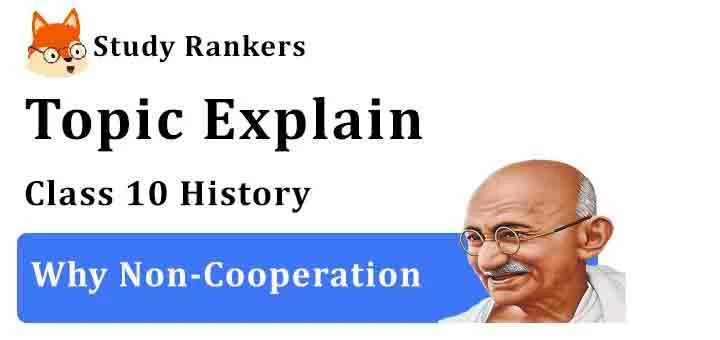Why Non-Cooperation - Chapter 2 Nationalism in India Class 10 History
Why Non-cooperation topic is given here, a part of Chapter 2 Nationalism in India Class 10 History will help in understanding the complex topics easily. You will be able to understand the subject in a more advanced way and also in a simpler way. It will make you understand the various factors through which one can improve their efficiency.
| Study Material for Class 10 History Chapter 2 Nationalism in India |
|---|

Why Non-cooperation - Chapter 2 Nationalism in India Class 10 History
• Following Rowlatt act of 1919 and Jallianwala Bagh massacre, Indian National Congress withdrew its support from British reforms.
• After the limitation of Rowlatt Satyagraha, Gandhiji felt the need to launch a more broad-based movement in India by bringing the Hindus and Muslims closer together. Khilafat issue was one such movement took up by the Gandhiji through which he can unify Hindu and Muslims together under a united struggle against British and start Non-cooperation movement.
• In his famous book Hind Swaraj (1909) Mahatma Gandhi declared that British rule was established in India with the cooperation of Indians, and had survived only because of this cooperation. If Indians refused to cooperate, British rule in India would collapse within a year, and swaraj would come.
→ Thus, the main motive behind the movement of Non-cooperation was self-governance and obtaining full independence.
How could non-cooperation become a movement?
• Gandhiji proposed that the movement should unfold in stages. It should begin with the surrender of titles that the government awarded, and a boycott of civil services, army, police, courts and legislative councils, schools, and foreign goods. Then, in case the government used repression, a full civil disobedience campaign would be launched.
• Through the summer of 1920, Gandhi accompanied by the Ali brothers undertook a nationwide tour mobilising popular support for the movement.
• Many within the Congress were, however, concerned about the proposals. They were reluctant to boycott the council elections scheduled for November 1920, and they feared that the movement might lead to popular violence.
• In the months between September and December there was an intense tussle within the Congress. For a while there seemed no meeting point between the supporters and the opponents of the movement.
• Finally, at the Congress session at Nagpur in December 1920, a compromise was worked out and the Non-Cooperation programme was adopted.
